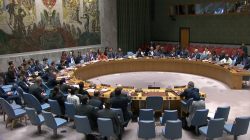COP27: Arab countries’ development undermined by climate change, leaders tell UN
- 2022-11-09 05:11:14


 Pierre Rayer: Art, Science, and Happiness: The Universal Mission of Transmission to Future Generations through Patronage at the Louvre Abu Dhabi
Pierre Rayer: Art, Science, and Happiness: The Universal Mission of Transmission to Future Generations through Patronage at the Louvre Abu Dhabi Ahly crowned Super champions after dramatic extra-time win over Modern Future FC
Ahly crowned Super champions after dramatic extra-time win over Modern Future FC Yemeni Honey..A Development Wealth Threatened By Conflict And Climate Change
Yemeni Honey..A Development Wealth Threatened By Conflict And Climate Change California wildfires: Millions warned of possible power cut
California wildfires: Millions warned of possible power cut Central African rebels launch attacks near capital
Central African rebels launch attacks near capital Airplane lands itself after in-flight emergency, in a first for aviation automation
Airplane lands itself after in-flight emergency, in a first for aviation automation UNSC Urges De-escalation in Yemen, Calls for Release of UN Staff
UNSC Urges De-escalation in Yemen, Calls for Release of UN Staff Putin meets Syrian foreign, defence ministers to discuss strategic cooperation
Putin meets Syrian foreign, defence ministers to discuss strategic cooperation Libya declares three days of mourning after plane crash in Türkiye
Libya declares three days of mourning after plane crash in Türkiye Arab, International Welcome for Yemen Prisoner Exchange Agreement
Arab, International Welcome for Yemen Prisoner Exchange Agreement
